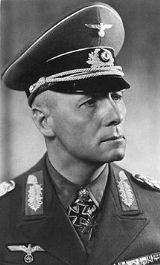
Field Marshal
of World War II
. He won the respect of both his own troops and the enemies he fought.
He was a highly decorated officer in World War I
, and was awarded the Pour le Mérite
for his exploits on the Italian front
. In World War II, he further distinguished himself as the commander of the 7th Panzer Division during the 1940 invasion of France
.
In a man to man fight, the winner is he who has one more round in his magazine.![]()
Courage which goes against military expediency is stupidity, or, if it is insisted upon by a commander, irresponsibility.![]()
In view of my services in Africa, I have the chance of dying by poison. Two generals have brought it with them. It is fatal in three seconds. If I take the poison, none of the usual steps will be taken against my family; that is, against you. They will also leave my staff alone.![]()
Mortal danger is an effective antidote for fixed ideas.![]()
The German soldier has impressed the world, however the Italian Bersagliere soldier has impressed the German soldier.![]()
[speaking about Italians] Good soldiers, bad officers; however don't forget that without them we would not have any Civilization.![]()

